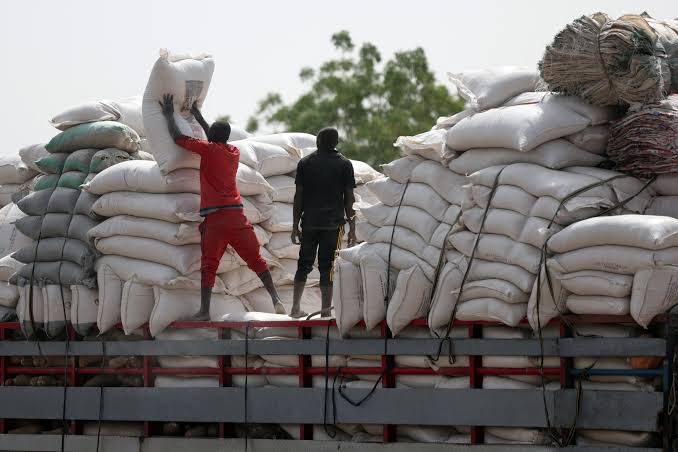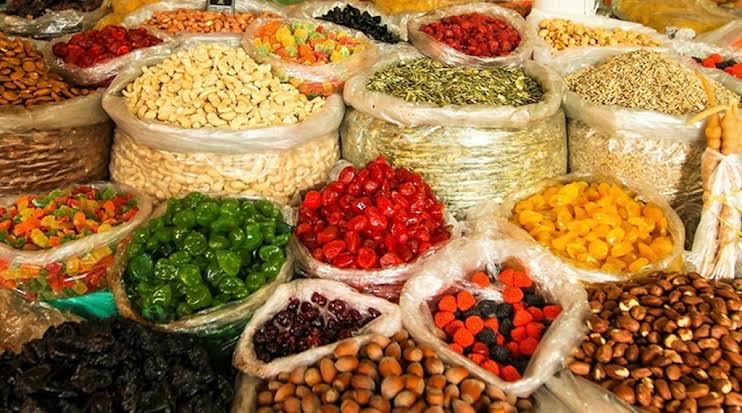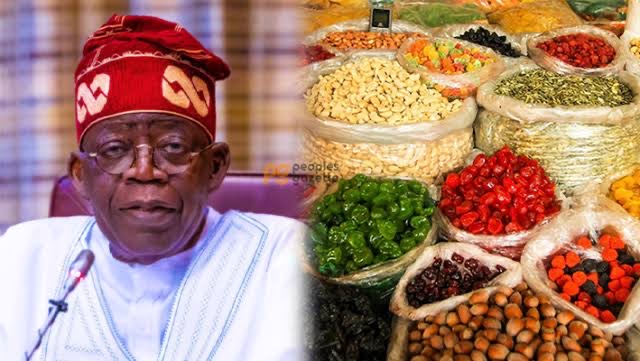The Minister of Agriculture and Food Security, Abubakar Kyari, said the Federal Government has agreed to contribute the sum of N2 trillion to fight food inflation and implement the Accelerated Stabilisation and Development Plan.
The Minister also said the Federal Government has approved a 150-day duty-free import period for food items under the scheme that allows for the importation of certain commodities across land and sea borders. The Minister disclosed this information at a press conference in Abuja on Monday.
He also outlined the implementation of the Presidential Accelerated Stabilisation and Progress Plan, President Bola Tinubu’s initiative to achieve food security and economic stability.
“Over the past few months, we have witnessed an increase in food prices across the country. There is virtually no food item whose price has not been increased beyond what many Nigerians can afford,” Kiari said.
According to the Minister, the 150-day duty-free import period for food items includes the suspension of duties, tariffs, and taxes on the importation of maize, husked brown rice, wheat, and cowpeas. Under the scheme, imported food items will be subjected to a Recommended Retail Price (RRP).
“I am again pleased that the government’s position is that standards will not compromise the safety of the various foods we consume,” he said.

“In addition to private sector imports, the Federal Government is set to import 250,000 tonnes of wheat and 250,000 tonnes of maize. The imported food is targeted to be supplied in semi-processed form to small-scale processors and millers throughout the country.
The Minister said the Federal Government will work with relevant stakeholders to set guaranteed minimum prices and absorb surplus food to meet standards. The Minister said the Federal Government will continue to increase production for the 2024/2025 agricultural cycle while continuing to support small-scale farmers in ongoing rainy season farming.
Other initiatives by the Federal Government include rolling out strategic engagement with youths and women across the Federation for immediate cultivation of greenhouse-grown crops and horticultural crops such as tomatoes and peppers to increase production, stabilize prices, and make them more competitive, he added. The Minister will accelerate ongoing consultations with the Nigerian Army to rapidly cultivate farmland under the Defense Farms Programme, while encouraging other militia groups to use available farmland secured for cultivation.
Kyari also revealed that the Renewed Hope National Livestock Transformation Implementation Committee will be established on Tuesday, July 9, 2024, with the aim of developing and implementing policies that prioritize livestock production, ensure consistency with the National Livestock Transformation Plan, and improve food security by promoting the production of fortified foods and ensuring the necessary support to scale up the Home Garden Initiative of the Office of the First Lady of the Federal Republic of Nigeria.
“Over the next 14 days, in close coordination with the Presidential Food Systems Coordination Unit (PFSCU) and the Economic Management Team (EMT), we will meet with relevant authorities to determine the implementation framework. We will ensure that information is made public to facilitate the participation of all stakeholders across the country.

“The PFSCU will provide the President with direct insights on these measures and will manage a dashboard to ensure accountability,” the President said.
Earlier, the Minister reiterated the President’s commitment to achieving food security, saying: “As our country faces significant food security challenges, I wish to reinstate the President’s unwavering commitment to achieving food security and ensuring that no Nigerian goes to bed hungry.
“I can therefore assure all Nigerians that my team and I will swiftly and diligently implement these critical measures to ensure food security for all in the country in the short term.
At the same time, we intend to continue with our longer-term intervention strategy to address the root causes and ensure a sustainable and resilient food system in the country.
“He further noted that the affordability crisis in the country’s food security system is due to the fact that data from the National Bureau of Statistics showed that food inflation stood at 40.66% at the latest count.
“We have heard the outcry from Nigerians over the price of food and spices. Some now refer to tomatoes as gold and suggest various recipes for soups and dishes using these expensive foods. Foods once considered commonplace such as yams, plantains, and potatoes are now commanding prices so high that Nigerians are rightly wondering how and why this is happening,” he said.

“As the government led by President Bola Ahmed Tinubu GCFR, members of the Federal Executive Council and all other MDA officials are fully aware of the hardships caused by the soaring food prices in our country. There is no doubt that food inflation is a direct result of various factors. In some parts of the country, agricultural production is hampered by many factors that prevent smallholder farmers from optimally contributing to the country’s food supply. This has given a new dimension to the food issue, from affordability to availability of sufficient food.
He further enumerated the many measures taken by the Federal Government to make food available and curb its price. These include the release of 42,000 tonnes of various foodstuffs from the National Strategic Food Reserve and, the purchase of 58,500 tonnes of milled rice. Another 30,000 tonnes of rice was supplied by the Rice Processors Association of Nigeria. Unfortunately, prices continue to rise and in some cases, food is nowadays even unavailable.
“Government cannot allow this situation to continue.
Agriculture initiatives, programmes, and projects are being implemented under the Federal Ministry of Agriculture and Food Security and state governments have their own but we must respond to the creeping supply crisis,” he added.































